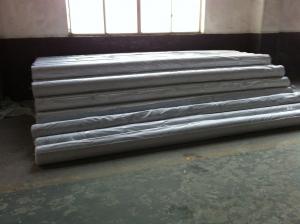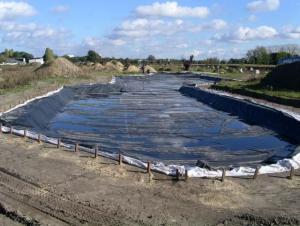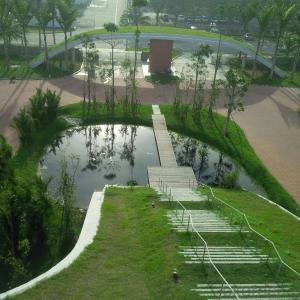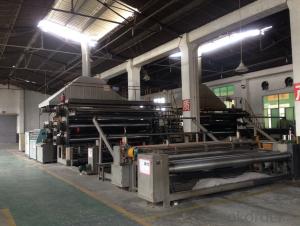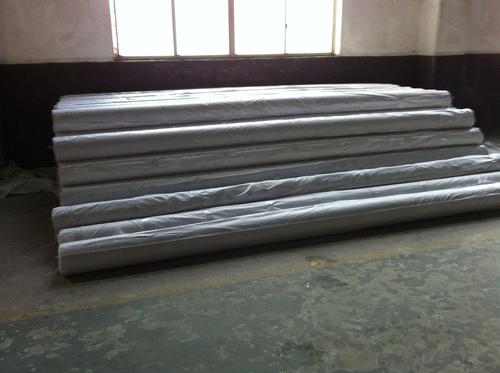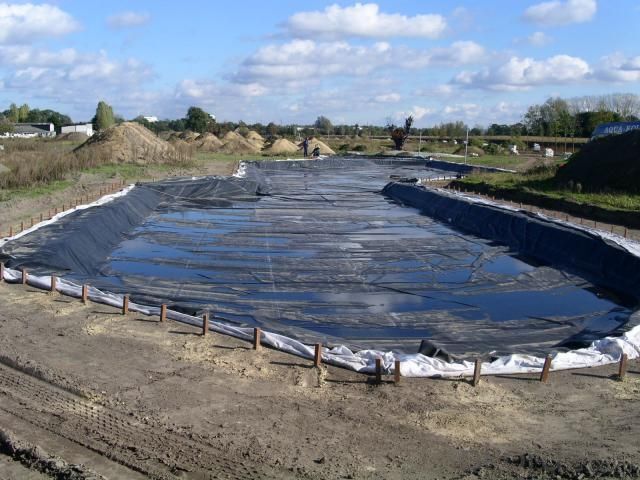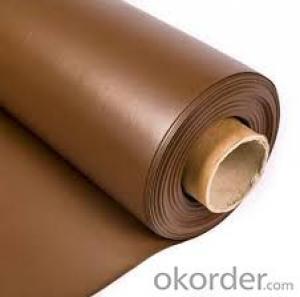Wide EPDM pond liner or for landscape 2015 HOT
- Loading Port:
- Qingdao
- Payment Terms:
- TT OR LC
- Min Order Qty:
- 1000 m²
- Supply Capability:
- 1000000 m²/month
OKorder Service Pledge
OKorder Financial Service
You Might Also Like
1. Introduction
| EPDM waterproof membrane is made from ternary ethylene-propylene
rubber, which is for waterproofing of exposed and non-exposed applications.
| EPDM waterproof membrane production adopts the world-advanced equipment of
cold feeding extrusion and continuous vulcanization technology.
| EPDM waterproof membrane is of high elasticity among high polymer waterproof materials
and becomes a world-popular waterproofing material.
2. Specification
1) Material: EPDM Rubber
2) Size: 1.2m/2m/3m/4m (width)*20m (length) or customized,
3) Thick: 1.2mm, 1.5mm, 2.0mm
4) Type: Weldable
5) Pattern: Non-reinforced (homogeneous)
6) Certificate: ISO9001/14001
3. Features
| Excellent physical and mechanical performance
| High tearing resistance
| Good deformation adaptability
| High puncture resistance
| High aging resistance
4. Applications
l Roofs, Basement, Toilets
l Industrial and civil building waterproofing
l Geosynthetic liner for swimming pool, channels, irrigation system
l Especially suitable for projects with high requirements in durability, anti-corrosion and
deformation.
- Q: Can a waterproofing membrane be used on stainless steel surfaces?
- Indeed, stainless steel surfaces can benefit from the application of a waterproofing membrane. Stainless steel, a resilient and non-corrosive material widely utilized across different industries, is not impervious to water damage or corrosion, particularly in severe conditions. By applying a waterproofing membrane onto stainless steel surfaces, an extra shield against moisture is established, effectively warding off potential water damage, rusting, and corrosion. To guarantee optimal adhesion and durable protection, it is crucial to ensure the compatibility of the waterproofing membrane with stainless steel and its correct application.
- Q: Are waterproofing membranes fire-resistant?
- No, waterproofing membranes are not inherently fire-resistant. However, there are specific types of waterproofing membranes that have fire-resistant properties and can be used in situations where fire protection is required.
- Q: Can a waterproofing membrane be used in conjunction with sustainable construction materials?
- Yes, a waterproofing membrane can be used in conjunction with sustainable construction materials. In fact, incorporating sustainable construction materials is increasingly becoming a priority in the construction industry due to the need for more environmentally friendly and energy-efficient buildings. Waterproofing membranes can be used to protect sustainable construction materials, such as recycled or low-impact materials, from water damage and moisture infiltration. These membranes create a barrier that prevents water from seeping through the materials, thus prolonging their lifespan and reducing the need for repair or replacement. Additionally, sustainable construction materials are often designed to be more energy-efficient, which can be further enhanced by using a waterproofing membrane. By preventing water damage, the membrane helps maintain the integrity of the building envelope, reducing the potential for energy loss through leaks or moisture intrusion. Moreover, some waterproofing membranes are specifically designed to be more sustainable themselves. For instance, there are eco-friendly membranes made from recycled materials or those that can be recycled at the end of their lifespan. These sustainable membranes minimize the environmental impact associated with their production and disposal. Overall, utilizing a waterproofing membrane in conjunction with sustainable construction materials is a smart and responsible approach to building design. It ensures the long-term durability and performance of the materials, while also contributing to a more sustainable and energy-efficient built environment.
- Q: Can waterproofing membranes be used on concrete countertops?
- Concrete countertops can indeed benefit from the application of waterproofing membranes. These membranes are specially crafted to thwart the infiltration of water and can be utilized on diverse surfaces, including concrete. By opting for a waterproofing membrane on a concrete countertop, one can effectively safeguard it against water harm, staining, and possible structural concerns. Furthermore, these membranes can augment the countertop's resilience and lifespan by averting moisture-induced problems, such as cracking or warping. It is imperative to verify that the selected waterproofing membrane is concrete-compatible and appropriate for countertop use.
- Q: Are waterproofing membranes resistant to hydraulic oils?
- Waterproofing membranes are typically not resistant to hydraulic oils. Hydraulic oils are designed to be highly lubricating and can often penetrate and degrade the integrity of waterproofing membranes. Therefore, it is important to ensure that if hydraulic oils are present in an area where waterproofing is required, additional protective measures, such as using chemical-resistant membranes or applying suitable coatings, are taken to prevent any potential damage to the waterproofing system. It is always recommended to consult with a professional waterproofing contractor or manufacturer for specific recommendations regarding the compatibility of waterproofing membranes with hydraulic oils in a particular application.
- Q: Can a waterproofing membrane be used on precast iron surfaces?
- Precast iron surfaces can benefit from the application of a waterproofing membrane, which serves as a protective layer against water infiltration. This membrane, consisting of a thin material, effectively blocks the entry of water or moisture into the surface. Its versatility allows it to be utilized on various surfaces, including precast iron. By acting as a barrier, the waterproofing membrane effectively safeguards the precast iron from detrimental effects like rust or corrosion that could arise from water exposure. This becomes particularly vital in settings where the precast iron surface is constantly exposed to water or humidity, such as outdoor installations or high humidity areas. Incorporating a waterproofing membrane on precast iron surfaces aids in prolonging the structure's lifespan and preserving its structural integrity.
- Q: Can a waterproofing membrane be used on tunnels with soundproofing systems?
- Tunnels with soundproofing systems can benefit from the use of a waterproofing membrane. It is common practice to integrate waterproofing membranes with soundproofing systems in tunnels. This is because tunnels are prone to water infiltration, which can cause structural damage and impact the performance of the soundproofing system. By applying a waterproofing membrane, the tunnel can be shielded from water intrusion, ensuring the durability and efficacy of the soundproofing system. Moreover, the waterproofing membrane aids in maintaining a dry and comfortable environment in the tunnel, which is essential for the efficient operation of the soundproofing system. Therefore, combining a waterproofing membrane with a soundproofing system is highly recommended in tunnels to provide both water protection and sound insulation.
- Q: How to choose waterproof membrane
- Third, from the physical quality of strict quality off From the appearance of visual inspection can only distinguish the composite tire coil, but failed to solve the selected products meet the quality requirements, which requires users to have the ability to test the technical institutions, according to the corresponding product standards for soluble content The physical properties of the factory test, with the soluble content of the project to control the product contains the amount of asphalt and modifier, but also to reveal the product used in the real face of the fetus can determine whether it is consistent with the product mark.
- Q: Can waterproofing membranes be used on shower walls?
- Yes, waterproofing membranes can be used on shower walls. These membranes are specifically designed to create a barrier against water, preventing leaks and protecting the underlying structure from moisture damage. Applying waterproofing membranes on shower walls is a common practice to ensure a watertight and durable shower enclosure.
- Q: How long does it take for a waterproofing membrane to cure?
- The curing time of a waterproofing membrane can vary due to different factors such as the membrane type, environmental conditions, and the specific product used. In general, most waterproofing membranes need at least 24 to 48 hours to fully cure. During this period, a chemical reaction occurs in the membrane, enabling it to create a strong and impenetrable barrier. However, it's important to consider that curing times can be influenced by temperature, humidity, and the thickness of the applied membrane. It is always advisable to follow the manufacturer's instructions and allocate sufficient time for the membrane to cure before exposing it to any stress or water.
Send your message to us
Wide EPDM pond liner or for landscape 2015 HOT
- Loading Port:
- Qingdao
- Payment Terms:
- TT OR LC
- Min Order Qty:
- 1000 m²
- Supply Capability:
- 1000000 m²/month
OKorder Service Pledge
OKorder Financial Service
Similar products
Hot products
Hot Searches
Related keywords
